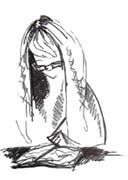 How does one review THE IDIOT? I have no idea. I can tell you that I enjoyed it, very much, and I can tell you roughly why, but when I put the book down--after enjoying it, very much, for quite a long time--I was baffled to realize that I have only the slightest of ideas as to what THE IDIOT is actually about.
How does one review THE IDIOT? I have no idea. I can tell you that I enjoyed it, very much, and I can tell you roughly why, but when I put the book down--after enjoying it, very much, for quite a long time--I was baffled to realize that I have only the slightest of ideas as to what THE IDIOT is actually about.Prince Myshkin, our hero, was a wonderful character, surrounded by several other fascinating and complex characters, all of whom were prone to lengthy conversations on various subjects in various sitting rooms, most of which I was able to follow well enough. I think where I fell off was in the subtle, devious relationships between the characters--who seemed constantly to be thinking one thing and saying another, with all sorts of strange motives that I never was able to unravel.
This left me feeling a bit like the Prince must have felt in attempting to have any sort of interaction with the other characters, particularly when one factors in the irony that the Prince, though viewed as an idiot by nearly everyone at one time or another, is easily the cleverest and most good-hearted man of any to make an appearance in the book--he seems at times to suffer only from his own niavete.
Even with all the intrigue and (on my part) confusion, I loved THE IDIOT for these two reasons:
1) The Prince. The back of the book makes the bold assertion that Myshkin is "Christ-like," and I enjoyed teasing out the metaphor as I read--I think it holds, loosely, but I won't go into it much. I'm sure there have been all manner of dissertations and literary articles written on the subject, and I'm just not equal to that, so I'll sum it up with "I think it holds, loosely." On top of that, I liked the Prince an awful lot for who he was and how he responded to various pressures (for the most part). Also, his inclination to suddenly say something brilliant was quite endearing, as was his unpredictability in speech and action.
2) The stories within the story. I loved this about The Brothers Karamazov as well (most notably "The Grand Inquisitor"): Dostoevsky has a way of imbedding fascinating short stories within the novels, and it's those that were easily my favorite parts of the book. Think Ippolit's dream (within the story of his "explanation"), or Myshkin's tale of the beheading toward the start of the book--these helped to break up the dialogue, while somehow moving the plot along to a different level altogether.
While I loved THE IDIOT, I think The Brothers Karamazov safely remains my favorite of Dostoevsky's novels. Dostoevsky has the uncanny ability to set some of the kindest, most good-hearted characters alongside some of the most devious and down-right evil, and it's this tension that carries THE IDIOT along as such a brilliant speed.
RATING: 4
 I tried, I really did. I loved Lolita: I had some steadfast determination to finish the book and when I finished it, I ultimately loved the novel itself, if not the content.I admired very much Nabokov's skill in handling such a disturbing subject. Nabokov's prose is beautiful and lovely to read, even when he writes of the most awful things.
I tried, I really did. I loved Lolita: I had some steadfast determination to finish the book and when I finished it, I ultimately loved the novel itself, if not the content.I admired very much Nabokov's skill in handling such a disturbing subject. Nabokov's prose is beautiful and lovely to read, even when he writes of the most awful things. They say that Tolstoy is the greatest of all novelists.
They say that Tolstoy is the greatest of all novelists. The devil comes to Moscow. Chaos ensues. There's a bit of a love story, but mostly a long cast of characters (who are hard to keep straight because they're all Russian and so have five or six nicknames) meets an assortment of bad ends at the hands of the devil's wiley cohorts. It's a rowdy book, written during Stalin's Soviet regime (here are some
The devil comes to Moscow. Chaos ensues. There's a bit of a love story, but mostly a long cast of characters (who are hard to keep straight because they're all Russian and so have five or six nicknames) meets an assortment of bad ends at the hands of the devil's wiley cohorts. It's a rowdy book, written during Stalin's Soviet regime (here are some 